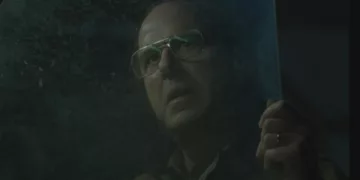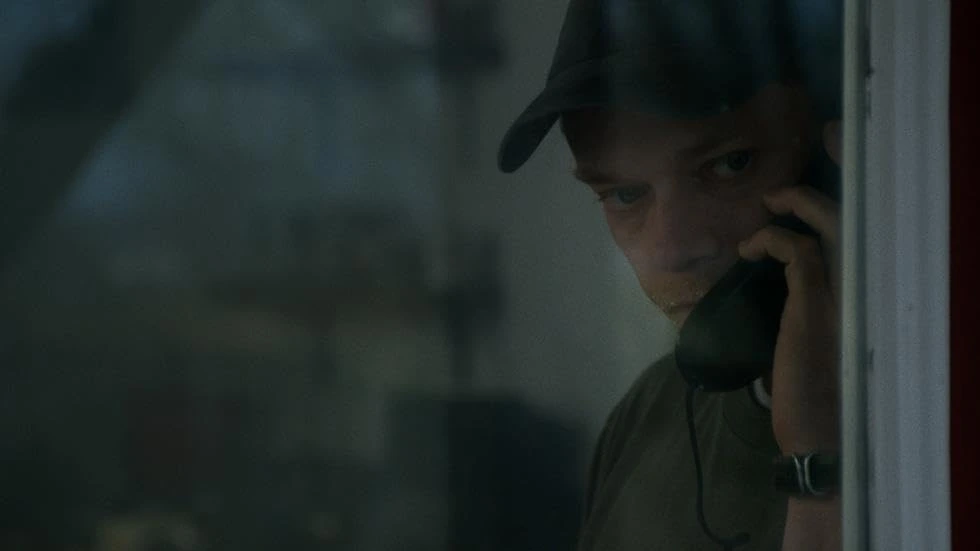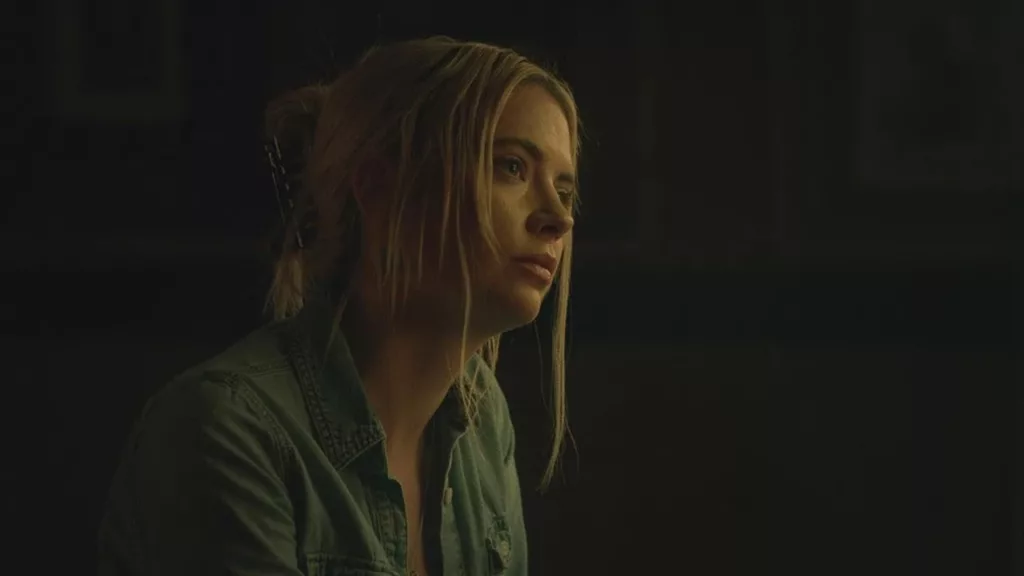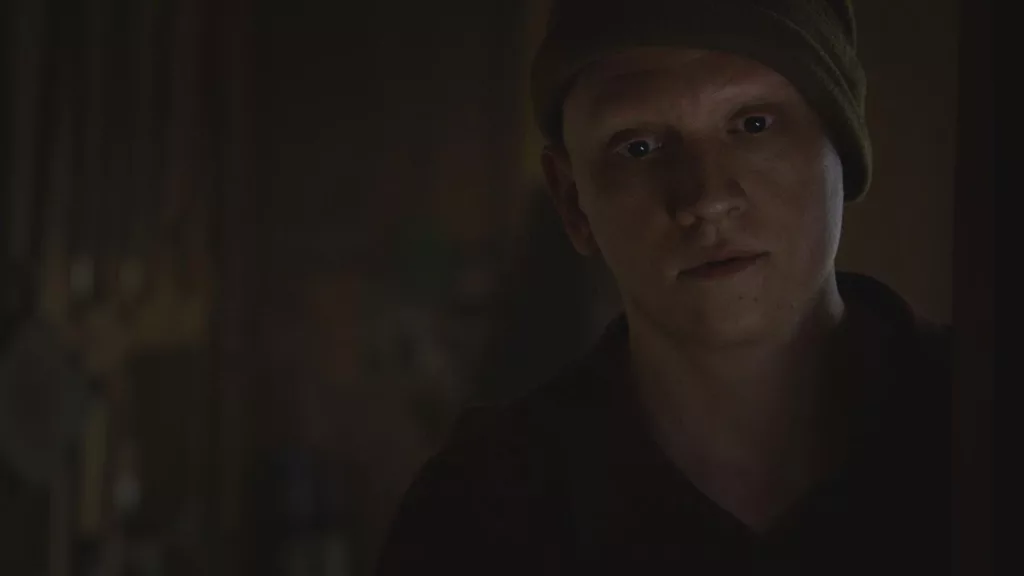On April 19, 1995, a truck bomb exploded outside the Alfred P. Murrah Federal Building in Oklahoma City, leaving 168 people dead in the worst act of domestic terrorism in American history. The perpetrator was Timothy McVeigh, an Iraq war veteran disaffected with the government. Writer Alex Gioulakis and director Mike Ott seek to understand how such a tragedy could occur through their film McVeigh, starring Alfie Allen as McVeigh.
Shot in a mood-sobering style, Ott keeps viewers at arm’s length from McVeigh. Through master shots and meditative pacing, we observe his descent not as a thriller but as a study of radicalization emerging from the ordinary. McVeigh lives a mundane life—selling bumper stickers at gun shows alongside friend Terry and starting a relationship with Cindy. But political unrest simmers beneath the surface as he falters further into antigovernment ideology, impacted by events like the Waco siege.
In vivid yet restrained performances, Allen anchors the film as McVeigh, while Brett Gelman and Anthony Carrigan bring an unsettling edge as his accomplices. With its stripped-back approach, McVeigh shines a light on the “banality of evil” and how daily routines can incubate atrocity. Ott’s direction engages us in the lived-in realities of American divisions coming undone, reflecting a truth that remains deeply unsettling. In telling this harrowing story, McVeigh finds power in its understated angle on the tragedy and its ordinary origins.
Everyday Acts, Extraordinary Evil
The film provides a look at Timothy McVeigh in the period leading up to the Oklahoma City bombing. We first see him working a stall at local gun shows, casually selling some bumper stickers to pass the time. It’s here that he crosses paths with an assortment of characters, like his friend Terry who shares his staunch anti-government views.
McVeigh also comes to know Frédéric, a strange figure who recruits McVeigh for some mysterious purpose. Despite the unclear intentions, McVeigh seems drawn to the sense of purpose it provides. Beyond these interactions, McVeigh lives a life without much direction. We see him starting a relationship with a waitress named Cindy, though he remains distant even in this.
It’s during these stretches of normalcy that the seeds of something far darker begin to take shape. McVeigh finds fellowship in like-minded radicals like Richard Snell, bonding over their shared rage towards the government. He also increasingly turns to the ideas espoused by the growing extremist movement rising up across the nation. As these influences sink in, McVeigh’s casual acquisition of bomb-making supplies like fertilizer takes on a clearer purpose.
Though undertaking immense preparation, McVeigh maintains an unnerving sense of calm. He secretly fills his storage unit with chemicals alongside Terry, yet their talk remains as casual as ever. It’s unsettling to see how closely such an act of malice can emerge from routine actions. Through it all, McVeigh gives no indication of the devastation that he plans until the final scenes, where he is seen driving the loaded truck toward its destination.
The film ends here, sparing viewers a dramatization of the bombing itself. In its quiet depiction of McVeigh’s normal day-to-day, it reveals how catastrophe can grow from life’s mundane details rather than some extraordinary moment. It is a sobering glimpse of how evil hides within calm exteriors and ordinary deeds until it is too late.
Subtle Suspense: Directorial Craft Keeps Viewers On Edge
Director Mike Ott deploys a purposefully subdued visual approach in McVeigh that elevates the film’s unnerving tone. Working with cinematographer Daniel Vignal, Ott opts for a low-key palette grounded in shadows and muted tones. Scenes are lit in oranges and browns that cloak the screen in an air of sullen disquiet.
Characters are often framed from afar, forcing viewers to observe McVeigh’s actions like spying witnesses. Whether at a gun show or buying bomb materials, shots maintain distance from their subject. This strengthens the experience of watching from the sidelines as plans take shape. When Ott gradually pushes in on moments like McVeigh being pulled over by police, tension steadily rises as we’re given mere glimpses of what’s unfolding.
The long shots also deepen unease by letting scenes linger past expectations. We’re kept watching as McVeigh loads chemicals silently with his friend, unable to escape the ominous task unfolding frame by frame. Compounding the effect are the film’s ambient sound design choices. From droning news reports to low murmurs in diner booths, non-diegetic audio heightens the creeping sense that danger is impending.
Even intimate scenes are lit and framed with a detached look. During McVeigh’s date with a local woman, the two are shown seated across from each other in a booth veiled in shadows. The voyeuristic perspective leaves viewers as detached observers of developing events rather than immersed participants. This maintains Ott’s overarching goal of keeping the audience as off-kilter observers of McVeigh’s inscrutable actions instead of sympathizers.
Through ingenious visual storytelling, Ott ratchets away unease from fleeting moments that stick with viewers long after. His restrained approach proves the adage that sometimes less is more when unsettling an audience. With McVeigh, Ott demonstrates how subtle suspense can be far more compelling than overt shocks through an artfully unsettling piece of cinematic direction.
The Enigma of Evil: Alfie Allen’s Mesmerizing McVeigh
Director Mike Ott’s film rests entirely on the shoulders of Alfie Allen, and he proves more than up to the tremendous task. His unnerving portrayal of Timothy McVeigh is a masterclass in subtlety. Through only minor expressions and gestures, Allen renders this monstrous figure into a human yet haunting enigma.
We’re given mere glimpses into McVeigh’s convoluted psyche. Allen ekes out each hint through stress that flickers across his face, or how tightly he clutches objects in fleeting moments of agitation. Even when McVeigh sits stoically, Allen imbues him with palpable inner turmoil just beneath the surface. It’s chilling to observe his rage simmering so close to boiling over.
Despite the role’s challenging demands, Allen never slips too far toward caricature. McVeigh appears to be a man truly lost in his wrath, yet Allen ensures we view him through eyes aware of our shared humanity, even in its darkest recesses. This nuanced tightrope walk is a remarkable high-wire act that could crumble with a single misstep.
Where others may have simply portrayed McVeigh as a monster, Allen locates compelling complexity within the character’s convoluted motives and deteriorating mental state. He anchors the film with an anchor performance that resonates long after, like the horror it depicts. Through his mesmerizing work, Allen single-handedly transforms a difficult subject into an unmissable cinematic achievement.
Ott’s film lives or dies by our ability to understand McVeigh, and only an actor as tremendously skilled as Allen could succeed where others may fail. His command of McVeigh’s many tangled layers is nothing short of a tour de force that will surely come to define a generation of actors. For all its bleak material, Allen ensures we can’t tear ourselves from the enigma at its core.
Illuminating the Insidiousness of Radicalization
McVeigh takes an unorthodox approach by portraying Timothy McVeigh and the bombing’s lead-up not as the actions of a lunatic but as developments emerging from regular life. Ott seems to argue that radicalization isn’t born from illness but from mundanity, appearing gradually amid routine duties and relationships until an atrocity has formed beneath the surface of normalcy.
We see McVeigh simply going about his daily activities: selling bumper stickers, visiting with friends, dating a woman. But discomforting signs emerge in the subtle stress on his face during traffic stops or fraught discussions with associates. His distress and anger seem to arise from regular encounters rather than any instability.
When McVeigh purchases the bombs’ ingredients, it plays out as an ordinary chore between him and his concerned friend Terry. Their casual shopping highlights how atrocities can incubate within the banality of familiar rituals. Evil needs no derangement, just regular participation in a society that breeds enough dissolution over time.
Ott also illuminates the “banality of evil” concept through his deliberately distanced camerawork. We observe McVeigh as much as we would a zoo animal, sizing up clues to his psyche but never truly understanding. Even scenes depicting monstrous acts like buying detonators feel disturbingly plain.
This approach gives McVeigh a profoundly unnerving vision. Rather than a sensationalized killer, we see evil taking form within recognizable routines and relationships. The film leaves us contemplating how societal factors drew someone as ordinary as McVeigh toward such darkness.
By presenting radicalization as an insidious process arising from nondescript spaces, Ott crafts a viewing experience that unsettles in a meaningfully impactful way. He forces us to acknowledge radicalism’s roots in everyday life and consider society’s role in cultivating not just heroes but also monsters.
Pacing and Portrayals: Room for Growth
McVeigh adopts a realistically restrained approach to its storytelling, but this strategy is not fully successful. Some critics argue its detached, slow pace becomes tedious rather than immersive at times. Character arcs could also have been fleshed out further to give audiences more insight.
Alfie Allen’s reserved performance as Timothy McVeigh remains impactful. But with such a condensed runtime, not all figures leave a strong impression due to limited development. We learn sparse concrete details about McVeigh’s psyche, and secondary roles seem more like set dressing than multifaceted people. Pacing picks up toward the end yet fails to fully remedy the early lethargy.
While recreating explosive events risks gratuitous spectacle, fading key players in and out without illumination feels disconnected. Crafting nuanced relationships could have imbued the film’s ominous themes with richer poignancy. Viewers are rightly left contemplating societal ills, but a touch more emotive resonance in certain portrayals may have strengthened this reflection.
For all its carefully devised minimalism, McVeigh’s tale still resonates by conveying tragedy’s far-reaching impact. Its portrait of radicalization growing silently within everyday spaces effectively highlights dangers left unchecked. Ott directs with an understanding of weighty subject matter, and Allen delivers a performance that lingers long after viewing.
Although room for improvement exists in pacing and character arcs, McVeigh finds meaning through its unsettling final message. It illustrates how catastrophe can emerge from places of apparent normalcy and routine. In shining a light on radicalism’s roots, the film leaves an impression greater than criticisms of its technique alone. Ultimately, Ott’s vision sparks thoughtful contemplation of societal fault lines and darkness that fester beneath the surface.
The Power of Restraint
In tackling one of the most devastating acts of terrorism on American soil, McVeigh takes on immense responsibility. Where others may have focused on dramatizing destruction, Ott remains disciplined in his vision. Confining the story to intimate moments building toward calamity, he skillfully translates the lived-in bleakness.
We experience McVeigh’s radicalization not through flashy bombast but through a subtle plunge into quiet dread. Allen pulls us deep into his character’s turmoil while revealing little. Supporting roles similarly breathe life into spare scenes. Ott’s direction maintains an observant attitude even in closeups, prioritizing unease over exploitation.
In refusing spectacle, McVeigh finds power. It probes the roots of hatred without glorifying violence. Choosing restraint over sensation, Ott transforms a monumental tragedy into an introspective nightmare. Few films address such complex darkness with equal care, understanding, and impact. While not an easy watch, its unsettling resonance lingers long after. McVeigh demonstrates how skill and sensitivity can elevate even the most disturbing of subjects.
The Review
McVeigh
McVeigh takes on an immensely challenging subject with nuance and care. Directors Ott and Gioulakis craft an unflinching yet intimate portrait of radicalization that forces reflection on societal fault lines. Through sparse storytelling and Alfie Allen's powerfully opaque lead performance, they burrow the audience deep into an atmosphere of simmering dread. While not for those seeking action or spectacle, McVeigh offers a masterfully restrained mediation on human darkness that transcends its real-life tragedy with unnerving power.
PROS
- A grounded, austere approach avoids sensationalizing violence
- Alfie Allen delivers a complex, impressively restrained lead performance
- Characterizes radicalization through subtle immersion in mundane bleakness
- Maintains an intellectual level of addressing complex societal issues
- It imparts a strong sense of unease through tightly focused direction
CONS
- Slow pacing may bore some looking for more dramatic storytelling
- Potentially an uncomfortable watch given the disturbing subject matter
- An open-ended conclusion leaves some questions unanswered




















































Discussion about this post